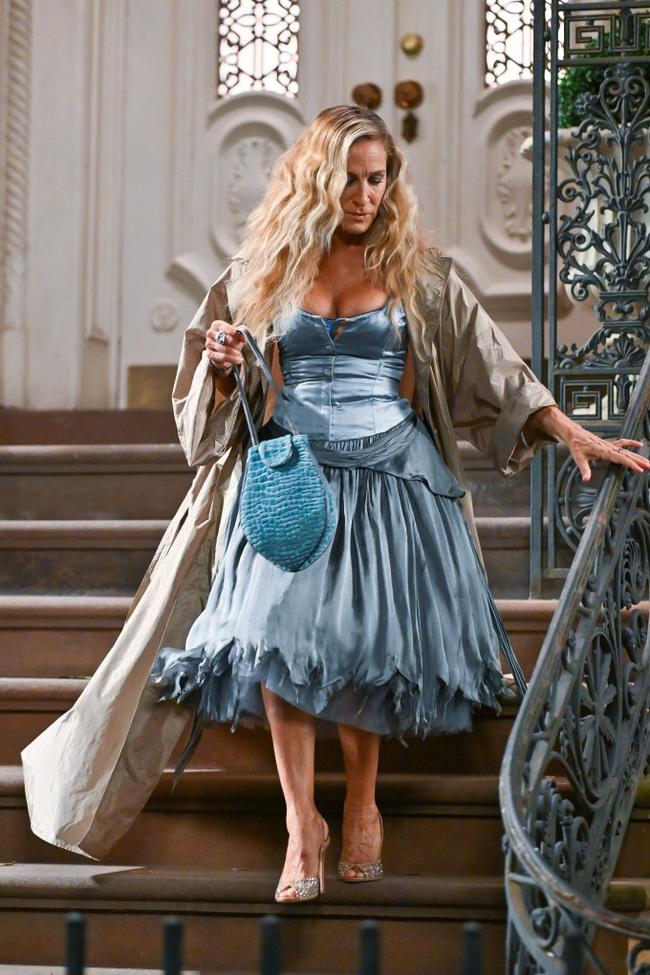Fashion
Culture
And just like that won’t be renewed, ending in the quiet unraveling of everything that once made these women unforgettable

Seventeen years after Carrie returned from Paris in the Sex and the City series finale, And Just Like That brought the beloved characters back to our screens. The world had changed, or so we hoped, and the show tried to reflect that. With more diverse casting and scenes where the original cast confronted their own problematic behavior, there were clear efforts toward inclusivity.
But none of it felt believable.
Then there was the product placement, relentless and almost impressive in its volume. Target, Arby’s, Pornhub, Peloton, Amazon, Smeg, Pellegrino, Airbnb, 1stDibs, Coke, Zoom, Tums, Ozempic… the list goes on. These weren’t the brands we were anticipating, or even hoping for.
Instead, we got Carrie and Miranda eating KFC in bed, followed by Carrie repeating what sounded suspiciously like the company’s slogan in the next scene. It wasn’t just product placement, it was a full-on commercial. And to save the worst for last: the Shein unboxing. Yes, really.
How did it go so wrong for characters we once knew so well?
If this was their attempt to reflect the world of 2025, then unchecked capitalism might be the only thing they actually got right. The show felt like a string of brand deals stitched together with embarrassing antics, microaggressions, and hollow dialogue.
Take Nya Wallace, played by Karen Pittman, a Black Columbia law professor introduced via an ignorant micro-racism in which Miranda assumes she’s not the teacher because of her braids. Miranda’s fumbling with race continues until she loudly declares she doesn’t want to be a white savior, right before literally saving Nya from a subway robbery.
I couldn't help but wonder: What were the writers thinking?
Miranda, arguably the most cringe of the original four, was once strong, opinionated, and at the top of her game as a lawyer. So how did she become so resistant to growth, especially when it comes to race? Her discomfort navigating these dynamics in the presence of a Black woman becomes the focal point, while Nya’s perspective is sidelined. What could have been an exploration of anti-racism instead devolves into yet another narrative centered on white womanhood.
The two form an unlikely friendship that spans two seasons, during which Nya’s voice all but disappears—reinforcing a familiar dynamic in which the realities of racialized women are rendered invisible, existing only in relation to the white characters around them.
No new character could fill the Samantha-shaped hole. She wasn’t just comic relief; she was part of the show’s DNA. Without her, the attempts to recreate the magic fell flat.
And Carrie… poor Carrie. Killing off Big (due to real-world allegations against Chris Noth) was the right call. But what they did to her afterward? Her personality turned cold, rigid, joyless. She was always self-centered, sure but she used to be warm, funny, witty, expressive, over-the-top, and vulnerable.
Then Aidan came back and stayed far too long. He was emotionally closed off, and their solution? To wait five years for each other. It had a flicker of Carrie’s classic hopeless romantic spirit, but it was all buildup and no payoff. Watching her roam around that big, empty apartment felt like watching her fade into the background.
She could’ve been healing, rediscovering her spark, calling the girls and exclaiming how she was “the best thing that ever happened to him!" There wasn’t even any emotionally charged overspending on shoes.
Would the old Carrie have been so harsh to Miranda for simply existing in her apartment? The scene where she yells at her for eating… yogurt? It felt like the writers wanted the show to be canceled.
Sure, the original six seasons had their fair share of problematic storylines. But there was a way to move forward, to evolve the show while honoring the characters we loved and rooted for. Back then, each woman was basically written with one defining personality trait, that’s how female characters were allowed to exist. But instead of using this reboot to deepen them, to add complexity and growth, the writers leaned into awkward, embarrassing scenes, unnecessary characters, and pointless storylines. (Charlotte’s dog being “canceled”?)
What made Sex and the City work in the first place wasn’t solely the men or the sex—it was them. All they needed was each other, a rotating cast of love interests, and a few cosmopolitans at whatever New York hotspot was buzzing that week. Their chemistry and their love for the city was more than enough.
The world is still obsessed with Carrie. Her wardrobe alone has now become one of the most iconic and coveted of all time. And after being on the fence about her for the last twenty years, I can finally say it: I wanted Carrie to win.
In another world, this reboot could have been fun, sexy, selfish, and reflective, with great friendships, great shoes, great cosmos, and great lovers in the greatest city in the world: New York.